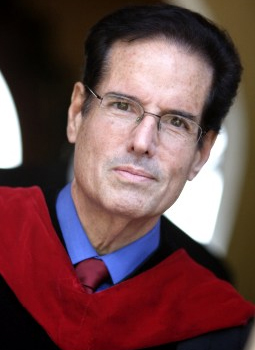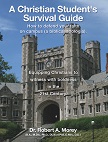 An Open Letter to Roman Catholics
An Open Letter to Roman Catholics
By Dr. Robert A. Morey
© Copyright Faith Defenders
Dear Catholic Friend,
Let us state at the outset that throughout this two part series that it is not our intent to offend those Roman Catholics who trust in Jesus Christ alone and rest their hope of salvation on God’s grace alone. We gladly embrace them as fellow Christians.
But there are those Roman Catholics who trust in their own good works to get them into heaven. They openly venerate Mary and pray to the saints. And, when they do these things, they are actually following the official teachings of the Roman Catholic Church!
It is our intent to refute a visible, earthly organization called the “Roman Catholic Church” whose headquarters is at Vatican City in Rome and whose earthly “head” is the Pope, considered the “Vicar of Christ”.
Please note that we are NOT attacking Catholics as people or their motives. We are dealing with those historic issues that caused the Protestant Reformation.
We did not invent these issues and we are quite aware of the fact that we will not solve them either. But we feel the time has come to clarify once again what exactly those issues are and why we are still “protesting” against the Roman system.
The first issue concerns the heart of the Gospel: Justification by faith apart from
works. If Romanism is in error on justification, then it is preaching another gospel and cannot be described as a true Christian church.
The Biblical Doctrine of Justification
I. The Greek verb dikaiow in Roman Law and society meant “to declare not guilty” or “to declare innocent of all charges” as a legal vindication in court. It was the opposite of a verdict or declaration of “guilty as charged”.
II. When it is used in a nontechnical sense, it simply meant “to be vindicated” before others. Old Testament: Genesis 44:16; Job 33:2, 32; Isaiah 43:9. New Testament: Matthew 13:37; Luke 10:29, 16:15.
III. But when it is used in its technical or theological sense in the Old and New Testaments, this word has the same legal or forensic declaratory meaning as in Roman Law. Old Testament: Deut. 25:1; Isaiah 5:23; Micah 6:11. New Testament: Romans 8:33-34.
IV. It is clearly in this sense that both the Father and the Son are said to be ‘justified”.
This can only mean that God is ‘declared innocent”, ‘declared not guilty’ or ‘vindicated from all charges’. Old Testament: Psalms 51:4. New Testament: Luke
7:29; Romans 3:4. 1 Timothy 3:16 Rotherham translation says, “declared righteous” and the Twentieth Century ‘pronounced righteous’.
V. The Greek verb ‘to justify’ is used in opposition to the word ‘to condemn’, i.e., ‘to pronounce a verdict of guilty as charged.’ Old Testament: Deuteronomy 25:1; Job
40:8; 1 Kings 8:32. New Testament: Romans 8:33-34.
VI. Just as ‘to condemn’ someone does not make him wicked, neither does ‘to justify’
someone make him righteous.
VII. The equivalent words and phrases that are used as literary parallels to the word ‘to justify’ mean ‘to declare innocent’ and ‘to treat as not guilty’. None of them means to make someone righteous. Old Testament: Psalms 32:2 “transgression is forgiven”, “sin covered”, “does not impute iniquity”. New Testament: Romans 4:3 “reckoned to him as righteousness”, 4:4 “reckoned”, 4:5 “reckoned as righteousness”, 4:6 “reckons righteousness”, 4:7 “forgiven”, 4:7 “sins covered”, 4:8 “will not take into account (sin)”, 4:9 “reckoned as righteousness”, 4:10 “reckoned”, 4:22 “reckoned as righteousness”,4:23 “reckoned”, 4:24 “reckoned”, 5:10 “reconciled” (cf. vs. 9 & 10).
VIII. Man’s justification before God is always based on God’s grace through Christ’s life, death and resurrection. Old Testament: Isaiah 53:11. New Testament: Romans 3:4,
24, 28; 4:25; 5:9; 2 Corinthians 5:21; Titus 3:7.
IX. Thus justification is a free gift and not something merited by works. New Testament: Romans 3:20-30; 4:1-12; 5:15-17; 6:23; Galatians 2:16-21.
X. The instrumental means of justification is faith apart from such works as baptism.
New Testament: Romans 3:22, 26-30; 4:1-12, 16; 5:1; Galatians 3:8, 11.
XI. The Protestant view of justification is the doctrine of the early church while the
Romanist doctrine cannot be found anywhere in the early church.
The Bible vs. Romanism:
How Romanists Try to Refute The Reformers
I. Romanists usually misrepresent the Reformers.
They often claim that the Reformers taught that sinners are justified ‘by faith alone’
in order to contrast this statement with James 2:24 ‘not by faith alone’. But this is not what they taught.
The Reformers taught that the ungodly are justified ‘solely’ (i.e. ‘only’) through faith. They did not say that we are justified ‘by faith that is alone’. They were careful to make the distinction between ‘only’ and ‘alone’.
They stated that the faith that justifies is ‘alone’ but is always accompanied by all the other virtues such as love, obedience, etc. Hence, it is ‘not alone’.
But what they did say was that the Bible makes it abundantly clear that the sole instrumental means by which one receives salvation is faith viewed as set apart from the other virtues such as obedience.
Why? Faith is the only ‘empty’ virtue that has no merit in and of itself. Faith is not to be viewed as being the meritorious basis of salvation. Christ’s work-not ours- is the meritorious basis of salvation.
Thus while salvation is ‘through’ faith as its sole means of reception, it is accompanied by all the other virtues.
II. Objection: What About James vs. Paul?
A. James uses the word ‘justify’ in its non-technical sense of a personal ‘vindication’ before man of one’s profession of faith. He emphasizes that you should validate your faith before others by the kind of life you live.
B. Thus James is emphasizing the demonstrating of justification and not how to achieve it.
C. Nowhere does James use the word “justify” to mean to make someone righteous.
III. Questions Which Romanists Must Answer:
A. Can you produce a single verse in the Bible where the concept of grace as a
“substance” is taught?
B. Can you show us a single verse where justification is described as ‘infused righteousness’?
C. Is not the concept of ‘grace as a divine substance infused into the soul’ a medieval idea?
D. On what basis do you ignore the legal, cultural, and exegetical meaning of the word dikaiow?
E. Is there a single passage in the Bible which links baptism with justification as the means of its reception?
F. Can you produce a single citation from the Apostolic Fathers where they taught the concept of ‘infused righteousness’?
The Biblical Doctrine of Authority
The Reformers did not say that the Bible was the only authority. This is why they appealed to logic, history, science, the Church fathers, tradition, councils, creeds, confessions, commentators, Greek and Hebrew scholars, etc.
But what they did say was that when it came to doctrine, there can be only one ultimate authority--the Bible.
The ‘buck’ has to stop somewhere. Thus the ‘final court of appeal’ is the Bible and not the Pope, councils, creeds, tradition, etc.
The other authorities (logic, history, etc.) are as good as far as they go. But they are not
the ultimate deciding factor in doctrine.
Just like the prophets, Apostles, Jesus, and the New Testament Church, Protestants appeal to the scriptures as the ‘final court of appeal’, i.e., the ultimate authority in all matters of faith.
I. Question: When deciding doctrine, to what did the prophets, Jesus, the Apostles, and the New Testament Church appeal as their ultimate authority, i.e., what was their ‘final court of appeal’ when seeking to establish doctrine?
Answer: They always appealed to the scriptures as the determining authority in matters of faith.
II. Question: How do we know this?
Answer: Throughout the Bible, the prophets, Jesus, the apostles, and the New Testament Church used certain key literary phrases that indicated an appeal to authority (Isaiah 8:20; Matthew 22:23-46; 1 Corinthians 15:3-4; Acts 15:12-18).
A. “as it is written” used 46 times:
1. Old Testament: 13 times (example: 2 Kings 23:21)
2. New Testament: 33 times (example: Romans 1:17)
B. “Scripture says” 7 times: (ex.: Rom. 4:3; 9:17; 10:11; 11:2)
C. “according to the Scriptures” 3 times: (ex.: 1 Cor. 15:3-4)
D. “the law and the prophets” 38 times: (ex.: Luke 24:44-47)
III. Question: Did the prophets, Jesus, the Apostles, or the New Testament Church ever appeal to ‘tradition’ as the authority for their doctrines?
Answer: Not once did the prophets, Jesus, the Apostles, or the New Testament Church appeal to tradition as the authority of their doctrines. As a matter of fact, the idea of people appealing to ‘tradition’ instead of Scripture is condemned by the prophets (Isaiah 29:13), Jesus (Matthew 15:1-9), and the Apostles (Colossians 2:8). The only Biblical author to use the word ‘tradition’ in a positive way is the Apostle Paul who clearly used it to refer to the handing down of scriptural doctrines such as the Gospel. Since the Church had just begun, it would be logically impossible for him to be referring to ‘historical traditions’ when the history of the Church had only just begun! How could it have any ‘historical traditions’ when it did not have any history yet?
The Romanist View of Authority
I. Romanism’s view of religious authority is usually based on the fallacy of circular reasoning. They appeal to their church’s authority to prove their church’s authority! This is like rowing with one oar. All you do is go around in circles.
Romanist: The ‘Church” is the ultimate authority.
Protestant: Who says so?
Romanist: The ‘Church’ says so.
Protestant: By what authority?
Romanist: The ‘Church’ is the ultimate authority.
II. Romanists are guilty of setting up a false dichotomy between Scripture and tradition. This is the fundamental logical error underlying their entire argument.
The moment it is admitted that there is such a thing as a ‘scriptural tradition’ the dichotomy falls apart. For example, in 1 Corinthians 15:3-4 the Apostle Paul clearly appeals to the authority of Scripture as the
basis for the Gospel. Then this scriptural teaching on the atonement is called a ‘tradition’ to hand down to others in 1 Corinthians 11:2.
III. Romanists use the logical fallacy of appealing to human authority.
Some papists argue, “Since there are so many denominations and interpretations of Scripture, we need someone to decide what is true. Thus we need the Pope! Of course, we can point out that Hitler, Joseph Smith, Rev. Moon, and many other people have all made that same exact same argument! We have no more reason to let the Pope do our thinking for us than to let all the other cult leaders!
Romanist Objection #1:
Note: Karl Keating is a Roman Catholic apologist and author of Catholicism And Fundamentalism,“Nowhere does the Bible say, ‘Scripture alone is sufficient’” (Karl Keating, “What’s Your Authority For That?”)
Protestant Response:
First, this is a logical fallacy. The fact that the Bible does not contain the exact words “Scripture alone is sufficient” does not logically imply that the concept that underlies those words cannot be found in the Bible. For example, where does the word ‘Trinity’ appear in the Bible? Where does it explicitly say “God in three persons?” Yet, the concept that underlies the doctrine of the Trinity can be found in the Bible even though the terminology was developed later on in Church history.
Second, this argument is self-refuting. Where does the Bible explicitly say “immaculate conception”, “papal infallibility”, the mass”, etc.? If this argument were valid, it would do far more damage to Romanism than to us.
Third, the Reformation doctrine simply states that the prophets, Jesus, the Apostles, and the New Testament Church always appealed to whatever written Scriptures existed in their day as the basis for their doctrines (for example, see 1 Corinthians 15:3-
4). They never appealed to ‘tradition’, ‘the Church’, ‘the pope’, etc.
Fourth, logically, since they only appealed to Scripture as the basis of their doctrine, then the burden of proof falls on the Romanists to demonstrate why we should appeal to anything else.
Lastly, in 1 Corinthians 4:6 we are told “not to go beyond what is written” in
Scripture. This statement of Paul is the sum and substance of “sola scriptura”.
Catholic Bibles:
Jerusalem Bible: “Keep to what is written.”
New American Bible: “Do not go beyond what is set down.”
Romanist Objection #2:
“The Bible actually denies that it is the complete rule of faith” (Karl Keating,
Catholicism And Fundamentalism, page 136).
Protestant Response:
First, this negative argument claims, without substantiation, that the authors of Scripture explicitly knew of and then clearly denied the doctrine of ‘sola scriptura’.
Second, please show us passages in the Bible where the authors deny that Scripture is the complete rule of faith. Protestants have been waiting several centuries for Romanists to ‘put up or shut up”, Yet, they have never found a single text to support their argument.
Romanist Objection #3:
“The Church tells us the Bible is inspired, and we can take the Church’s word for it precisely because the Church is infallible.” (Karl Keating, Catholicism And Fundamentalism, page 125).
Protestant Response:
This argument is based on circular reasoning: He ‘proves’ the Bible by the Church and then ‘proves’ the Church by the Bible! This is irrational to say the least!
Romanist Objections #4:
“The Church existed before the Bible. The Church made the Bible. Therefore: a) The Church made the Bible. Therefore: a) The Church is over the Bible, b) The Church has greater authority than the Bible.” (see Keating, Catholicism And Fundamentalism, pages 121-133 and also “How To Talk To Fundamentalists” tract).
Protestant Response:
There are major problems with this typical Romanist argument.
First, it is a logical fallacy to assume that: If x precedes y in z, then x has greater authority than y. In logic, chronology does not determine authority. This is the fallacy of irrelevance. For example, the Buddha came several centuries before Jesus. Is Buddha therefore over Jesus and does he have greater authority than Jesus? NO!
Second, historically, Romanism did not exist in the first century. So, how could it have anything to do with the canon of Scripture? The truth is that popery did not exist until many centuries after the canon was closed.
Third, Romanists are once again guilty of the fallacy of ambiguity. They speak of ‘the Bible’ as if no part of it existed before the church came into existence. (See Karl Keating, “How to Talk To Fundamentalists”, “…it was the Church that formed the Bible”). But a set of writings called the ‘Holy Scriptures’ existed before the church was created. That more Scripture was added to this “set” of writings does not logically imply that the Church ‘made’ the Bible.
Fourth, they have the chronology backwards. Faith comes through hearing the Word of God (Romans 10:11-17). The church is the community of believers that is created by the Word. It does not matter if Scripture is heard or read. Thus the Word of God creates faith and not the other way around.
Romanist Objection #5:
“But didn’t the Church decide doctrine in Acts 15 on the basis of its own authority instead of Scripture?” (See DVD or CD entitled Geneva vs. Romebetween
Protestant Apologist Dr. Robert A. Morey and Catholic Apologist Dr.Robert Fastiggi--a scholarly and gentleman’s debate.)
Protestant Response:
In Acts 15:13-22, James appealed to the Scriptures to settle the Gentile issue. Once he quoted the Scriptures that applied to the issue, the discussion was concluded. No further words needed to be said. The Scriptures had solved the issue.
Questions That Romanists Must Answer
1. Just as “no man can serve two masters”, is it not logically impossible to have more
than one ultimate authority?
2. When ‘push comes to shove’, is it not true that the Romanist’s ultimate authority rests in the decrees of its Popes and church councils and not in Scripture or tradition?
3. Is it not self-contradictory to appeal to the Bible as your authority to prove that you should not appeal to the Bible as your authority?
4. Is it not self-contradictory t appeal to the Bible as the authority of your doctrines while saying that the Protestants are in error because they appeal to the Bible as the authority for their doctrines?
5. Is it not self-contradictory to appeal to the Bible as your authority to prove that the
Pope or the ‘church’ and not the Bible is your authority?
6. Where in the Bible did the Old Testament prophets appeal to ‘tradition’ or any other authority than Scripture when establishing doctrine?
7. Can you show us just one verse where Jesus ever appealed to ‘tradition’ as the basis of his authority?
8. Can you show us just one verse where the apostles ever referred to ‘tradition’ as the
basis of their doctrines?
See scholarly debate (Video Debate; Geneva vs. Rome) between Protestant Dr. Robert A. Morey and Roman Catholic Apologist Dr. Robert Fastiggi below.
7-part video is posted on Brighteon.com: Part I, Part II, Part III, Part IV, Part V, Part VI & Part VII

FAITH DEFENDERS
www.faithdefenders.com






































